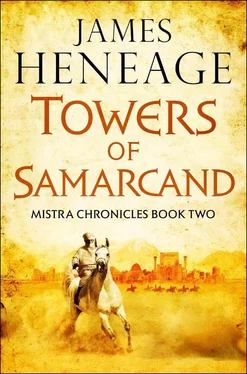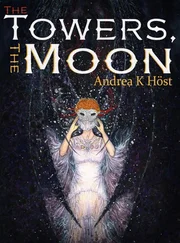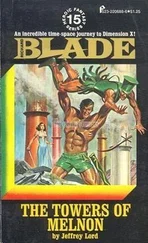James Heneage - The Towers of Samarcand
Здесь есть возможность читать онлайн «James Heneage - The Towers of Samarcand» весь текст электронной книги совершенно бесплатно (целиком полную версию без сокращений). В некоторых случаях можно слушать аудио, скачать через торрент в формате fb2 и присутствует краткое содержание. Год выпуска: 2014, Издательство: Heron Books, Жанр: Исторические приключения, на английском языке. Описание произведения, (предисловие) а так же отзывы посетителей доступны на портале библиотеки ЛибКат.
- Название:The Towers of Samarcand
- Автор:
- Издательство:Heron Books
- Жанр:
- Год:2014
- ISBN:нет данных
- Рейтинг книги:3 / 5. Голосов: 1
-
Избранное:Добавить в избранное
- Отзывы:
-
Ваша оценка:
- 60
- 1
- 2
- 3
- 4
- 5
The Towers of Samarcand: краткое содержание, описание и аннотация
Предлагаем к чтению аннотацию, описание, краткое содержание или предисловие (зависит от того, что написал сам автор книги «The Towers of Samarcand»). Если вы не нашли необходимую информацию о книге — напишите в комментариях, мы постараемся отыскать её.
The Towers of Samarcand — читать онлайн бесплатно полную книгу (весь текст) целиком
Ниже представлен текст книги, разбитый по страницам. Система сохранения места последней прочитанной страницы, позволяет с удобством читать онлайн бесплатно книгу «The Towers of Samarcand», без необходимости каждый раз заново искать на чём Вы остановились. Поставьте закладку, и сможете в любой момент перейти на страницу, на которой закончили чтение.
Интервал:
Закладка:
Early on, he’d seen Luke’s ways with horses; how he could talk to them, be understood by them. He saw how Luke loved them above all things and decided that his punishment would be to be removed from them. His father had given him Luke to train. He hadn’t said how.
*
Over the winter months, life in the camp was pared down to the necessities for survival. In the early days, when the sun still had some pale energy, the meat from animals was pegged out to dry and huge vats of ewes’ or mares’ milk boiled to extract butter and the rock-hard curds that would keep through the cold days and be turned into yogurt. Cured meat and millet meal were stored inside the gers alongside piles of dried cow dung and sheep pellets for fuel.
Afterwards Luke would remember it as a sort of hibernation where all activity was rationed, directed solely to the task of staying alive. He spent much of the time sitting with Arkal in the ger, where the light through the horn of the smoke hole disfigured all that it touched. At first, Arkal just stared at him. Then, by degrees, she began to talk to him. Then to teach him.
First, she taught him the words to describe the pale cocoon of their existence. Khana was the wooden lattice, and she stretched her thin arm out to touch it, on to which the isegei , or felt, was attached; the poles in the ceiling above were uni and the smoke hole, which could be opened and closed by these pulley ropes, was the toghona .
When the snow paused, they went outside and he learnt the words for the trees that bunched on the valley sides like teeth, for the freezing river below them and the snow all around. She limped over to the giant open sheds that stretched between poles, pulling his sleeve as they went. She told him about the sheep and cattle and goats that lived there. She pointed high, high into the sky, to describe the clouds and wind that moved them and the black birds that were flung about on its currents.
By now he knew that the strange girl who’d sought shelter from the storm had survived. Her ger had been erected away from the others with the same horsehides and skulls surrounding it like hunched spectres. She never appeared but the old man did, usually to scavenge amongst the bones left outside doors or to gather water from the river. Luke wanted to know about them but Arkal scowled and tapped her head to say they were mad and dragged him away to show him other things.
And so Luke learnt to speak their language, thankful for the gift that Fiorenza had said was the most remarkable she’d seen. He learnt simple words at first and some names. The chief was called Etabul, his son Gomil. The mad man had no name but he was the shaman who would enter trances to connect the tribe to their ancestors and the old, old gods of the wind and steppe that they’d not quite forgotten in the onslaught of Islam. The girl was called Shulen and might be his daughter and was a witch. It was said that she had the art of healing although few dared approach her for she was unclean and evil spirits walked at her side.
Arkal told him that Gomil was the best archer and bowman in the tribe but that he was a proud and violent man. He’d gone with Yakub to fight for Bayezid at Nicopolis where the tribe had lost many men. He’d returned from the battle full of hate for the infidel West, repeating again and again Bayezid’s threat to water his horses at the altar of St Peter’s in Rome. But his father had shaken his head and talked of Tamerlane and now this infidel, Lug, was living among them. She told him that Gomil hated him entirely.
Arkal became his friend, shy at first then firmer than granite. Luke told her about himself, how he was a Varangian and how Varangians had once been numbered in their thousands, an imperial guard to an emperor that ruled in Europe and Asia. Now they were few and there was little of the Empire left to rule. He didn’t tell her of the treasure but then what was there to tell? Only Plethon and Anna knew where it was. What it was.
As the weeks dragged on and the air turned colder and great drifts of snow piled high against the gers, holding their doors closed fast, the life of the tribe became confined to the tent. Luke came to understand that the ger was a place of individual territories: the right side for the men, their bows and dogs; the left for the women, the children and the cooking. The hearth was a sacred place where the family spirits dwelt and where no one should tread, positioned such that the noonday sun would strike it daily through the toghona. Luke understood the importance of these rules as the weeks became months and the space inside the tent grew smaller by the day.
Then the first murmur of spring arrived on the breeze. The sun came out and washed over the snow like Cypriot wine and men and women emerged from their tents blinking and rubbing their eyes. Children ran down to the river to break the ice and plunge into its icy torrent. Women joined them to wash away the dirt of weeks and the men checked the horses which, to Luke’s astonishment, had almost all survived.
But it didn’t last. After a few hours, clouds hurried in to mask the soft heat of the sun and an icy wind came down the valley from the north, shaking snow from the trees. Soon people retreated back to the warmth and doors were pulled shut.
Another storm hit them that night and the gers trembled and rattled beneath its assault. Great forks of lightning fractured the dark and thunder shook the earth, making Berta and Arkal cling to each other with every crash. The boy rose from his pallet and stood there, shaking with fear. He turned to his mother and, in his rush to be with her, tripped and fell headlong into the fire.
At first, no one was quite sure what had happened. Then lightning lit up the tent and the boy was crouching there, his face a contortion of burns, his mouth open, too shocked to scream. Torguk leapt from his pallet and rushed for the bucket of water, hurling it at the boy while Berta thrashed at his smoking clothes. Then he screamed.
Arkal was shouting at Luke and gesturing to the door. ‘Take him to the shaman’s daughter! My father is too frightened. Go! ’
Luke lifted the boy in his arms as Arkal opened the door. However he held him, he seemed to touch a burnt part of the body and the boy writhed and clawed and bit to be free. Outside the tent, the air was a confusion of snow and flying debris. Luke hunched his big frame into a shield for the child, turning his back to the wind and moving slowly towards where he thought the shaman’s tent stood.
‘ Shulen! ’
The wind picked up the shout and scattered it into a thousand fragments.
‘ Shulen! Where are you? ’
He could hardly see anything in the darkness and the snow was in his eyes, blinding him. He opened his mouth to yell again. In an instant, his mouth was full of freezing water, choking him. The boy beneath him was no longer struggling. Perhaps he was dead.
A flash of lightning lit the world around him. He thought he saw skull-poles away to his right. He lurched forward, pulling his cloak over the boy and feeling the heat of terrible burns against his arms.
‘ Shulen! ’ he screamed into the night, wiping the snow from his eyes with the rim of his cloak.
He stumbled against the side of a tent, feeling rope against the side of his arm. The boy was shaking in his arms and Luke felt warm vomit wash down his forearm. The boy was alive.
‘ Shulen! ’
He didn’t even know if she would help. She was an outcast, a pariah, a witch. He’d never heard her speak more than a word at a time.
Why should she help him?
His elbow hit something upright and wooden; a door. He threw his weight against it.
He fell into the tent, landing on his elbows to protect the child. He looked up, shaking his head to clear the snow from his face and hair. Someone was standing above him who was tall and slender and free of dirt. She was dressed in a white caftan that fell from the contours of her body like rain.
Читать дальшеИнтервал:
Закладка:
Похожие книги на «The Towers of Samarcand»
Представляем Вашему вниманию похожие книги на «The Towers of Samarcand» списком для выбора. Мы отобрали схожую по названию и смыслу литературу в надежде предоставить читателям больше вариантов отыскать новые, интересные, ещё непрочитанные произведения.
Обсуждение, отзывы о книге «The Towers of Samarcand» и просто собственные мнения читателей. Оставьте ваши комментарии, напишите, что Вы думаете о произведении, его смысле или главных героях. Укажите что конкретно понравилось, а что нет, и почему Вы так считаете.












